MuleSoft developers are at the heart of connecting applications, data, and devices within an organization. They play a key role in facilitating the seamless flow of information across systems.
Skills required for a MuleSoft developer include a deep understanding of API-led connectivity, experience with MuleSoft's Anypoint Platform, and abilities in integration patterns and data transformation. Additionally, problem-solving and effective communication are important skills for these developers.
Candidates can write these abilities in their resumes, but you can’t verify them without on-the-job MuleSoft Developer skill tests.
In this post, we will explore 8 essential MuleSoft Developer skills, 10 secondary skills and how to assess them so you can make informed hiring decisions.
Table of contents
8 fundamental MuleSoft Developer skills and traits
The best skills for MuleSoft Developers include API Development, DataWeave Proficiency, Anypoint Platform, MUnit Testing, Error Handling, CI/CD Practices, Security Implementation and CloudHub Deployment.
Let’s dive into the details by examining the 8 essential skills of a MuleSoft Developer.
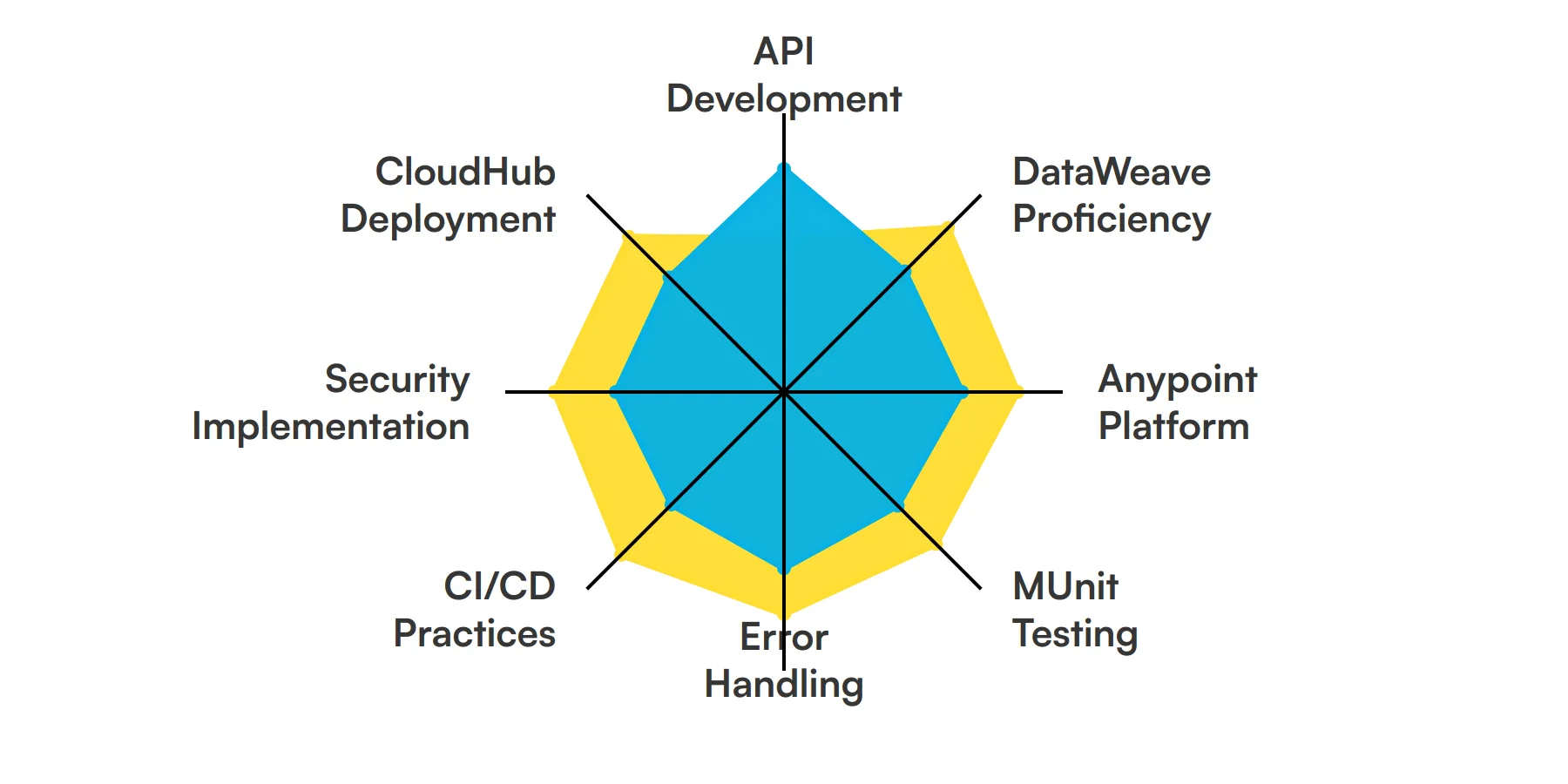
API Development
MuleSoft developers need to design, build, and manage APIs. This skill is central because APIs facilitate the communication between different software applications, making them integral for integrating diverse systems.
Check out our guide for a comprehensive list of interview questions.
DataWeave Proficiency
DataWeave is MuleSoft's expression language for data transformation. A MuleSoft developer uses this to transform data between different formats such as JSON, XML, and CSV, which is crucial for ensuring seamless data flow across systems.
Anypoint Platform
Understanding the Anypoint Platform is necessary for deploying and managing APIs and integrations. This platform enables MuleSoft developers to design, build, deploy, and manage APIs all in one place, enhancing productivity and efficiency.
For more insights, check out our guide to writing a Mulesoft Developer Job Description.
MUnit Testing
MUnit is MuleSoft’s testing framework. Developers use it to write and run tests on Mule applications, ensuring that the integrations work as expected before going live. This skill helps in maintaining the reliability of business-critical applications.
Error Handling
Effective error handling strategies are essential for MuleSoft developers to ensure applications are robust and user-friendly. This involves managing exceptions and unexpected issues without disrupting the user experience or data integrity.
Check out our guide for a comprehensive list of interview questions.
CI/CD Practices
Continuous Integration and Continuous Deployment are practices that MuleSoft developers use to automate the testing and deployment of Mule applications. This skill helps in delivering updates more frequently and reliably.
Security Implementation
Implementing security in API development is critical. MuleSoft developers must secure APIs against unauthorized access and threats, which involves applying policies, using OAuth, and ensuring data encryption.
For more insights, check out our guide to writing a Cyber Security Engineer Job Description.
CloudHub Deployment
CloudHub is MuleSoft’s cloud-based integration platform as a service (iPaaS). Developers need to know how to deploy Mule applications on CloudHub to manage and scale APIs globally without managing the underlying hardware.
10 secondary MuleSoft Developer skills and traits
The best skills for MuleSoft Developers include Java/Spring Framework, Source Control, SOAP Services, RESTful Services, Database Integration, Performance Tuning, Scalability Solutions, Message Queueing, Batch Processing and XML and JSON.
Let’s dive into the details by examining the 10 secondary skills of a MuleSoft Developer.
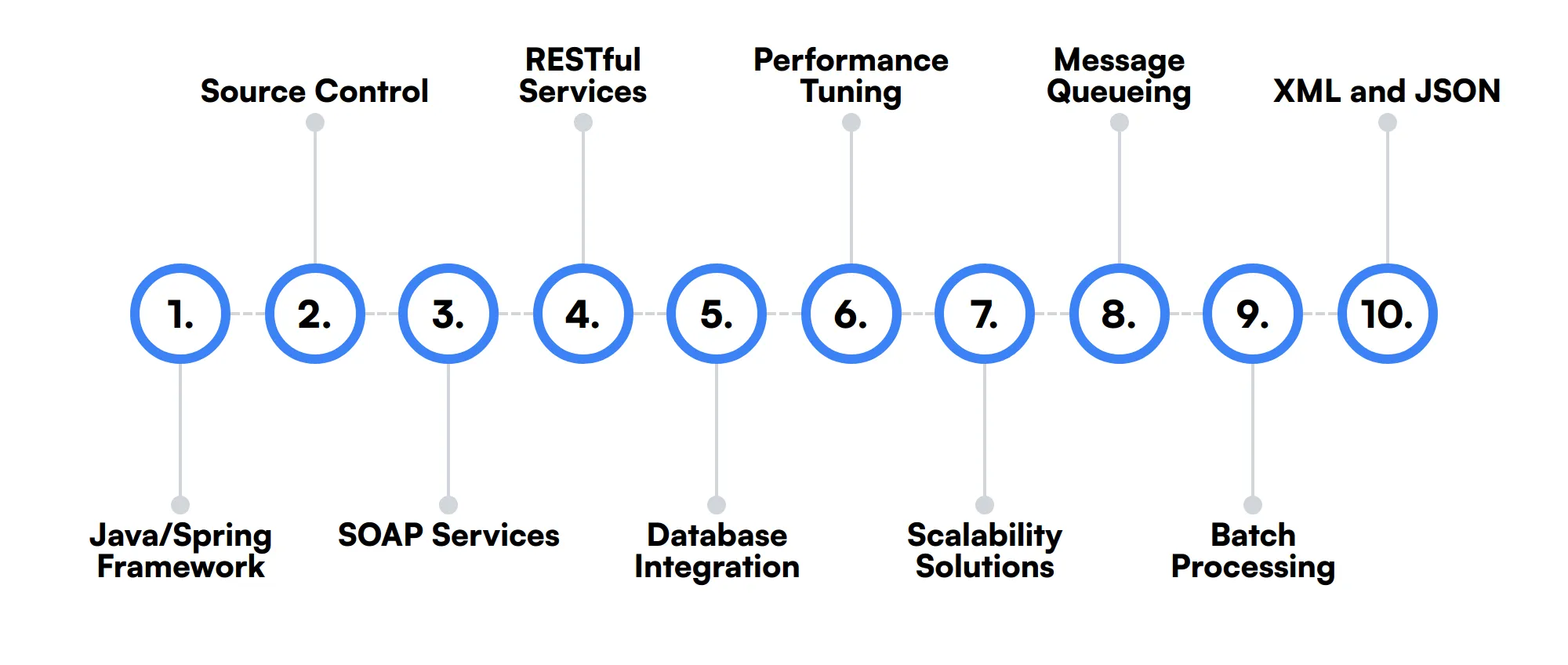
Java/Spring Framework
Knowledge of Java and Spring Framework can be beneficial for MuleSoft developers, as MuleSoft is built on Java. This helps in customizing behaviors and creating complex integrations.
Source Control
Using source control systems like Git is important for versioning and collaborating on projects. This skill helps MuleSoft developers manage changes and maintain the integrity of their codebase.
SOAP Services
Understanding SOAP services is useful for MuleSoft developers when integrating with legacy systems that expose their functionalities through SOAP.
RESTful Services
Knowledge of RESTful services is crucial for creating and integrating with modern web services. MuleSoft developers often need to build or consume RESTful APIs.
Database Integration
Skills in database integration involve connecting and manipulating databases directly from Mule applications. This includes executing SQL queries and handling transactions.
Performance Tuning
MuleSoft developers should be able to tune the performance of Mule applications. This includes optimizing data processing and managing memory usage to ensure applications run efficiently.
Scalability Solutions
Designing solutions that can scale effectively is important for handling increased loads. MuleSoft developers need to ensure that applications can grow without performance degradation.
Message Queueing
Understanding message queueing technologies like JMS or RabbitMQ helps MuleSoft developers in managing asynchronous communications and ensuring reliable message delivery.
Batch Processing
Batch processing is often required in large-scale data integration scenarios. MuleSoft developers use this to process data in large volumes efficiently.
XML and JSON
Proficiency in XML and JSON is necessary for MuleSoft developers as these are the primary formats for data interchange in web services and APIs.
How to assess MuleSoft Developer skills and traits
Assessing the skills and traits of a Mulesoft Developer involves more than just glancing at their resume. It's about understanding how well they can handle real-world tasks such as API development, data integration using DataWeave, and deploying applications on CloudHub. A thorough evaluation requires a deep dive into their practical abilities and problem-solving approach.
Traditional interviews might not fully capture a candidate's expertise in areas like MUnit testing or CI/CD practices. This is where skills assessments come into play. By using targeted tests, you can measure a candidate's proficiency in essential Mulesoft skills. For instance, Adaface assessments offer a way to evaluate these competencies effectively, ensuring a 2x improvement in the quality of your hires.
Moreover, these assessments help in understanding how a developer approaches error handling and security implementations, crucial for maintaining the integrity and reliability of your applications. By integrating these tests early in the hiring process, you can achieve an 85% reduction in screening time, streamlining your recruitment and ensuring that only the most capable candidates move forward.
Let’s look at how to assess MuleSoft Developer skills with these 4 talent assessments.
REST API Test
Our REST API Test evaluates a candidate's ability to understand and work with RESTful APIs, focusing on creating, interacting, and testing these essential web services.
The test assesses knowledge of REST principles, HTTP methods, status codes, authentication techniques, and serialization formats. It also covers API design and best practices for backend service architecture.
Candidates who perform well demonstrate a strong grasp of API integration and the technical aptitude required to handle complex coding challenges in real-world scenarios.
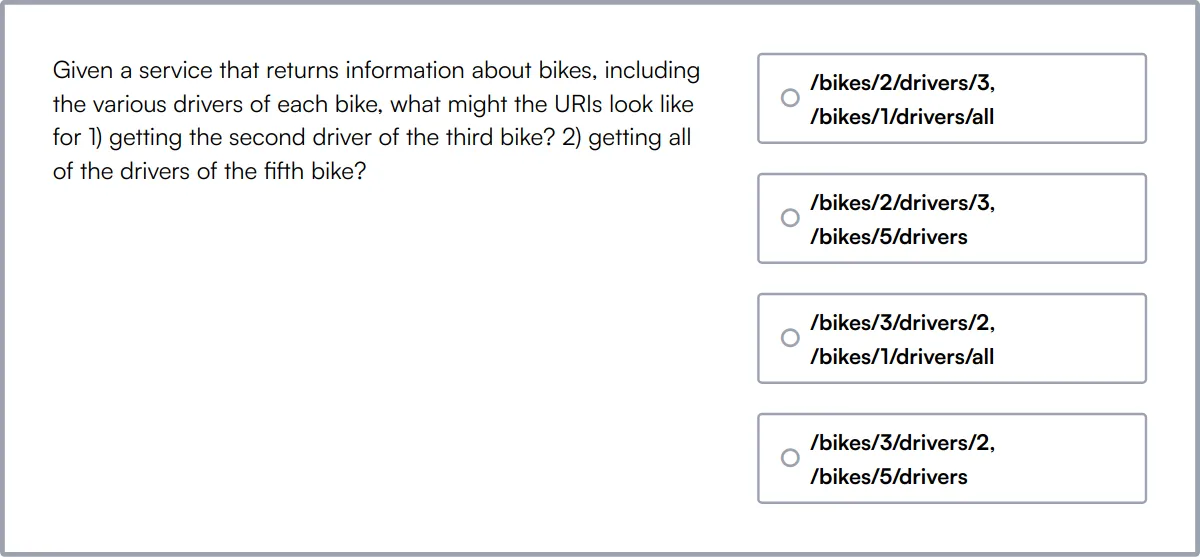
Elasticsearch Test
Our Elasticsearch Test measures a candidate's proficiency in managing and utilizing Elasticsearch for data indexing, search queries, and document retrieval.
This test evaluates abilities in configuring and optimizing Elasticsearch clusters, data modeling, and creating efficient search queries. It also covers aspects of cluster management, performance optimization, and security.
High-scoring individuals are adept at handling large-scale data environments, ensuring effective data distribution and integration with other systems.
Azure DevOps Test
Our Azure DevOps Test is designed to assess a candidate's skills in implementing DevOps practices using Azure technologies, including cloud infrastructure and continuous integration.
The test challenges candidates with scenarios involving Python scripting, Linux file systems, and Azure-specific tasks such as managing virtual machines, storage, and databases.
Successful candidates will demonstrate a comprehensive understanding of cloud computing basics, infrastructure as code, and the ability to deploy and manage Azure resources effectively.
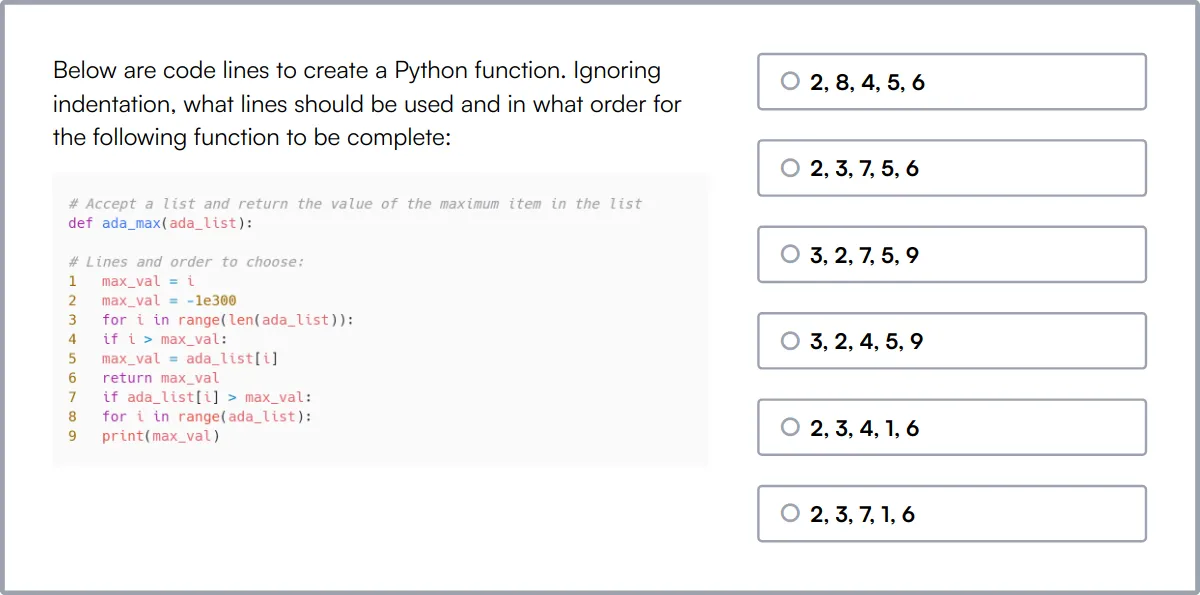
Cyber Security Assessment Test
Our Cyber Security Assessment Test evaluates candidates on their ability to understand and mitigate cybersecurity threats, focusing on network security, cryptography, and web security.
The test covers a wide range of cybersecurity topics, including the detection of security risks like SQL injections and malware, and the implementation of defenses such as firewalls and encryption.
Candidates excelling in this test are well-versed in creating strategies for data security, performing risk assessments, and conducting network tests to ensure robust cybersecurity defenses.
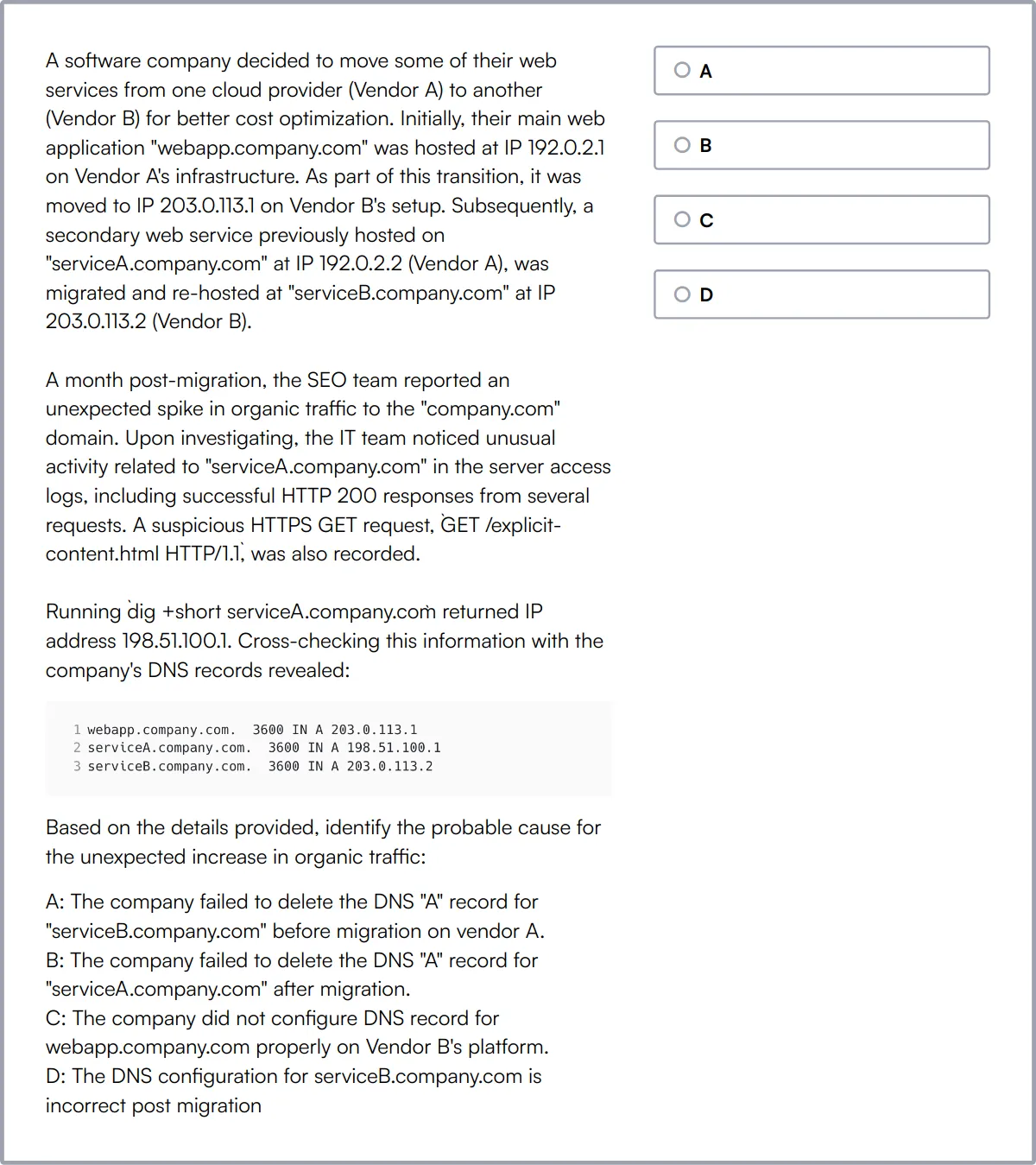
Summary: The 8 key MuleSoft Developer skills and how to test for them
| MuleSoft Developer skill | How to assess them |
|---|---|
| 1. API Development | Evaluate ability to design and manage scalable APIs. |
| 2. DataWeave Proficiency | Assess skills in transforming and mapping data effectively. |
| 3. Anypoint Platform | Check familiarity with Mulesoft's integration platform capabilities. |
| 4. MUnit Testing | Determine proficiency in writing and executing Mule tests. |
| 5. Error Handling | Review strategies for managing and resolving exceptions. |
| 6. CI/CD Practices | Examine experience with continuous integration and deployment workflows. |
| 7. Security Implementation | Assess knowledge in applying security protocols and measures. |
| 8. CloudHub Deployment | Evaluate skills in deploying applications on Mulesoft's CloudHub. |
Mulesoft Assessment Test
MuleSoft Developer skills FAQs
What skills are necessary for a Mulesoft Developer to handle API development?
A Mulesoft Developer should be proficient in designing, building, and managing APIs using Mulesoft’s Anypoint Platform. Understanding RESTful and SOAP services is key, along with knowledge of API-led connectivity and API management.
How can a recruiter assess a candidate's proficiency in DataWeave for a Mulesoft Developer role?
Assessing a candidate's DataWeave proficiency can be done by reviewing their experience with transforming data in Mule applications, asking for specific examples of past projects, or conducting practical tests that involve writing DataWeave scripts.
What are the best practices for MUnit testing in Mulesoft development?
Best practices for MUnit testing include writing test cases for all critical flows, ensuring code coverage metrics are met, and integrating MUnit tests into CI/CD pipelines for automated testing and continuous quality checks.
Why is error handling important in Mulesoft development?
Effective error handling ensures that Mule applications are reliable and maintainable. It helps in gracefully managing runtime errors and exceptions, thus improving the user experience and system stability.
What should a recruiter look for in a Mulesoft Developer's experience with CI/CD practices?
Recruiters should look for experience with automated deployment pipelines, familiarity with tools like Jenkins or GitLab, and a clear understanding of how to integrate Mulesoft applications into these pipelines.
How does understanding CloudHub deployment benefit a Mulesoft Developer?
Understanding CloudHub deployment is beneficial as it allows developers to deploy and manage applications in the cloud efficiently. Knowledge of CloudHub provides insights into scaling, application monitoring, and runtime management.
What role does security implementation play in the responsibilities of a Mulesoft Developer?
Security implementation is key to protecting data and services accessed through APIs. A Mulesoft Developer must implement secure configurations, manage access controls, and ensure compliance with security standards and practices.
How important is Java or Spring Framework knowledge for a Mulesoft Developer?
Java or Spring Framework knowledge is important as Mulesoft is built on Java. It helps in customizing behaviors, writing custom Java components, and integrating with other Java-based applications effectively.

40 min skill tests.
No trick questions.
Accurate shortlisting.
We make it easy for you to find the best candidates in your pipeline with a 40 min skills test.
Try for freeRelated posts
Free resources



